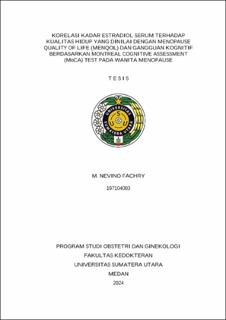Korelasi Kadar Estradiol Serum terhadap Kualitas Hidup yang Dinilai dengan Menopause Quality of Life (MENQOL) dan Gangguan Kognitif Berdasarkan Montreal Cognitive Assessment (MoCA) Test pada Wanita Menopause
Correlation between Estradiol Serum Level and Quality of Life Assessed by Menopause Quality of Life (MENQOL) and Cognitive Impairment Assesed by Montreal Cognitive Assessment (MoCA) Test in Menopausal Women

Date
2024Author
Fachry, M Nevino
Advisor(s)
Siregar, Muhammad Fidel Ganis
Ardiansyah, Edy
Metadata
Show full item recordAbstract
Background: Menopause is a physiological transition that occurs in aging women, often accompanied by common symptoms such as hot flushes and vaginal dryness. The relationship between hormonal changes, particularly estradiol, and a woman's quality of life and cognitive function is of interest, as fluctuations in estradiol levels are thought to be linked to the severity of menopausal symptoms. This study aims to assess the association between estradiol levels and the quality of life and cognitive function in postmenopausal women.
Methods: This observational analytical study employed a cross-sectional design to evaluate the relationship between estradiol levels, menopausal quality of life (using MENQOL), and cognitive impairment (using the MoCA test) at Prof. CPL Hospital, Universitas Sumatera Utara, Medan, Indonesia, from December 2023 to January 2024. The study included postmenopausal women (no menstruation for at least 12 consecutive months) who had not undergone hysterectomy or oophorectomy and had never received hormone replacement therapy. Statistical analysis was performed using SPSS version 24.0.
Results: A total of 32 participants were included in the study, with a mean age of 57.6 ± 5.2 years and an average menopause duration of 7.8 ± 5.2 years. Although no significant association was found between estradiol levels and MENQOL scores (P = 0.51 with r = 0.094, indicating a very weak correlation), the study demonstrated a strong positive correlation between estradiol levels and MoCA scores (P < 0.05, r = 0.885), suggesting that higher estradiol levels are associated with better cognitive function as measured by MoCA scores.
Conclusion: The study found a positive association between estradiol levels and cognitive function in postmenopausal women, while estradiol levels were not associated with overall quality of life in the studied population.
Collections
- Master Theses [328]
